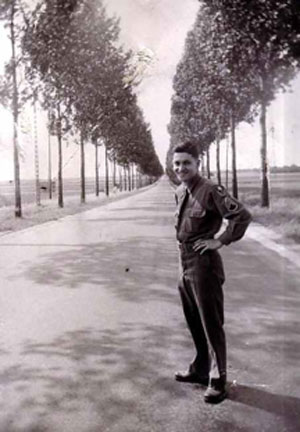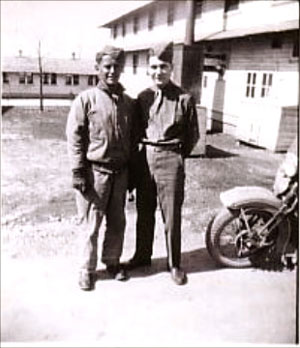
BY HEATHER DUBIN | Warren Allen Smith made it through World War II in the Army without firing a rifle.
Wearing a crisp yellow, collared shirt with black slacks, the U.S. Army veteran, born Oct. 27, 1921, gave a riveting interview at his West Village apartment earlier this week about his eclectic past.
Smith, a gay atheist, is originally from Minburn, Iowa, population 365.
“In my little town, they painted a barn yellow because the kid was not drafted,” he said. “It was strange if you weren’t in the Army.”
Smith completed one year of college at the University of Northern Iowa in Cedar Falls, where he studied English literature, music and journalism before he was drafted in 1942. Raised a Methodist, Smith became an Emersonian at school, and started a humanist club there. His interest in atheism grew as a faculty sponsor of the club was also an atheist.
“I joined the Unitarians in Des Moines — I’m still a dues-paying member,” Smith noted. “They joke about me because I’ve never attended.”
Smith began his military career at Fort Knox for basic training. Later at Fort Dix, his educational experience and ability to type 113 words per minute landed him in company clerk training instead of soldier training.
There were 300 new men every 13 weeks for training, and the Army was in dire need of clerks.
“When I was actually sent abroad, I was the acting first sergeant because nobody could keep the records,” Smith said. “I was a company clerk, and I didn’t know how to clean a gun.”
His journey overseas started from a Hudson River dock, and it was harrowing. All the men on his ship received a medal for crossing the Atlantic Ocean successfully; Smith used his hands to demonstrate how the ship zigzagged to avoid submarines.
Once they arrived in Liverpool, the men were put on an overnight train to Southampton. Smith recalled that the shades were pulled down, and they could not see England at all.
Their next step was to board another ship, and in an hour they were on Omaha Beach in Normandy. Smith explained that there were huge iron structures on the beach that prevented tanks from coming in, and there was a hill, which is why the Nazis also could not reach them.
As the company clerk, Smith was responsible for bringing along his cohorts’ files.
“I’m the one with all the records of the 250 men with my group — otherwise everyone wouldn’t have benefits today,” he said.
Smith and his company had to walk through the water to get to the beach, holding their rifles overhead to keep them from getting wet. He confided that none of the other men knew that Smith had no idea how to clean, much less use, his rifle.
Smith could not recall anyone helping him carry the records he put in a bag. However, he said he could have ordered someone to do so. When they reached the top, they were there for a day or so in the rain, and slept in pup tents.
“The fact that I was in a war didn’t sort of dawn on me,” he said. “I was an English major — but hadn’t read any World War I stories.”
Another part of Smith’s job was to lead “Reveille” for daily calisthenics.
“In the morning I had to exercise people,” he said. “I was not gay, you could not be gay, I didn’t know I was gay.”
Smith relocated to anther spot for a few weeks. There were no Nazis around since they were already falling back toward Paris. Since he was a quick typist, Adjutant General Floyd W. Brown recruited Smith for Supreme Headquarters. Brown told him, “Get in the Packard,” and they, too, headed toward Paris.

“We tried to drive to Reims and there were no signs. The Germans had taken them all down,” Smith recounted. “We couldn’t get into Paris because the Germans were still there.”
Smith said the adjutant general was “swearing like mad at the chauffeur,” and recalled that he thought to himself he was collecting good material to write about.
They finally made it to Reims, 80 miles outside Paris, and happened upon an empty building where the Germans previously had been staying. The phones worked, so they moved in. Smith was there was from 1944 until the end of the war in 1945.
Future President Dwight D. Eisenhower, then supreme commander of the Allied Forces and a five-star general, transferred Smith’s office to the Little Red School, which was the largest school in town. Smith worked five doors down from Eisenhower — they did not interact — and the Germans signed their surrender to the Allies in a room five doors in the other direction.
Smith’s job at Supreme Headquarters was to ensure every soldier in Europe received his mail.
“By that time there was a million of them,” he said. Smith focused on getting people their mail the next day, and called his section “Morale Builders.”
“I’ve talked with veterans, and asked them, ‘What was the best part of your service?’ ” Smith said. “I got them to say, ‘Oh, mail call.’ ” While he admitted to slightly exaggerating, Smith was serious about soldiers wanting to forget everything the war came with.
Smith also took orders for General George S. Patton for tanks and soldiers, plus rations, such as beer, shirts and shoes.
“We were not the Home Depot, but we were the Army Depot,” he joked.
Every general was sending his section orders, and they had to check for supplies that were usually in England.
“If the beer supply went down, we could also get champagne from France,” he said.
Smith also learned ethics at this time.
“There were some colonels who would steal stuff from other colonels,” he added. “We knew who the liars were.
“I went to work every morning at 8 a.m., and I left work around 5 p.m. Being in the Army, if you were in Supreme Headquarters, was not like being in one of General Patton’s units — not at all,” he said.
There were 200 women who also did clerical work at Supreme Headquarters. Smith became friends with one of them, Corporal Fuqua. The two joined forces to provide 24-hour assistance to help a segregated unit of black American soldiers, who were holding the line in the Battle of Bastogne, to secure ammunition and enforcement.
“That was an important battle because there was nothing between the Nazis and Paris at this point, except a black group,” he said. “They built bridges and were cooks.”
Smith received two medals for his efforts during this period, one for the Battle of the Atlantic, the other for the Battle of Bastogne.
One day, Smith secured a jeep from a post office and drove with a friend to Verdun to see if he could find a record of his father, who had served in World War I, earned two Purple Hearts and fought in the Battle of Verdun. He found his name, and on the way back, someone took a shot at Smith and his friend in the jeep.
“We didn’t have any guns. We were enjoying the countryside,” he said.
Smith stepped on the gas, and, as it turned out, that was as close to combat as he got. Smith speculated it was probably a French Nazi sympathizer. Men and women who were caught helping the Germans were forced to shave their heads, he noted.
Smith does not attribute his assignment in World War II to luck, but said he simply had the right skill set.
“We all get prepared in different ways to handle life, and I handled it mainly by skills,” he said. “It wasn’t luck. You don’t succeed by luck, it’s all work.”
According to Smith, he picked up this mindset from the adjutant general.
“But my experience was positive,” he continued. “If you interview any other veterans, I don’t think you’re going to find that.”
After the war, Smith returned to the University of Northern Iowa on the G.I. Bill, followed by a Masters of Arts at Columbia University in English literature, where his adviser was Lionel Trilling, the famed literary critic. To get to New York, Smith cashed in the train ticket his parents bought him, and hitchhiked his way instead.
“I got there pretty quickly,” he said.
During his first week at Columbia in 1948, Smith met Fernando Vargas, a sound engineer, who would become his partner for 40 years until his death. Smith had not realized he was gay until then.
“When we went to my room, that’s when the mystery was solved,” he said.
Smith became a high school English teacher, first in Manhattan and then in New Canaan, Connecticut. He taught for 32 years. Starting in 1977, for more than a decade, he spent summers in the Caribbean working as a journalist. In the 1950s, Smith was also a book review editor at a humanist magazine, and later became the book review editor at The Humanist.
Currently, he is a columnist for The Pink Humanist.
In 1961, he and Vargas founded Variety, a recording studio. One of their first customers was Marvin Hamlisch, a young composer and conductor, who brought in Liza Minnelli, an actress and singer, when she was a high school junior. The couple did the soundtrack for Minnelli, who sang over the music.
A prolific writer, Smith has written eight books since turning 80, including a three-part autobiography.
He has been adopted by eight kids who all call him “Dad.” They are from other countries, and have lived in New York. Smith refers to the eight as his “modern family,” and said the kids are from dysfunctional families.
Together, they have formed a bond that transcends race and sexuality.
“All eight are straight, and all eight know about me,” he said. “Things have changed over the years. Kids today, their peers say, ‘I wish my dad were gay.’ ”



































